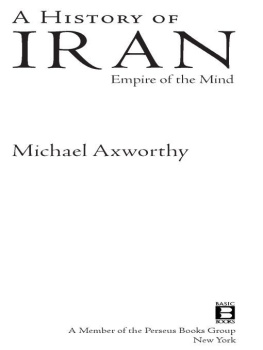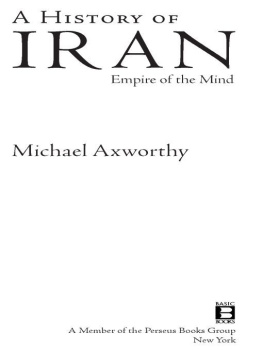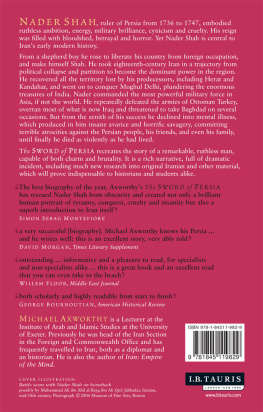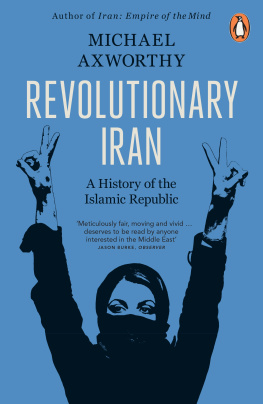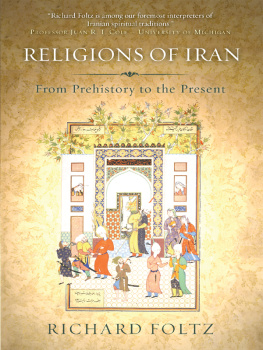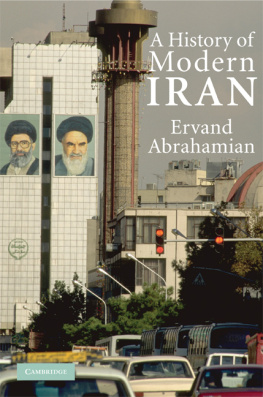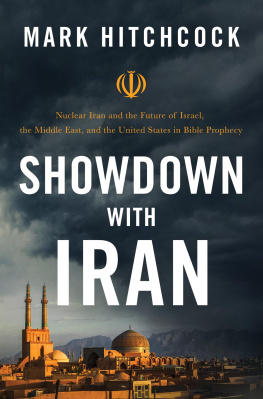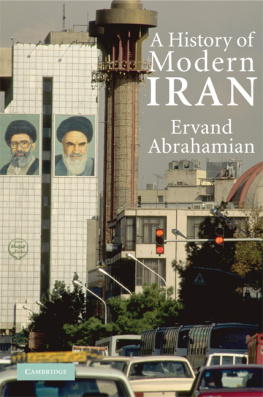PENGUIN BOOKS
IRAN: EMPIRE OF THE MIND
Michael Axworthy was head of the Iran section in the British Foreign Office from 19982000. He has written on contemporary Iran and other subjects for Prospect magazine, has debated Iranian affairs on BBC World and is now a lecturer at the Institute of Arab and Islamic Studies at the University of Exeter. His first book was the highly praised Swordof Persia.
To my wife Sally
Das Ewig-Weibliche zieht uns hinan
MICHAEL AXWORTHY
Iran:
Empire of the Mind
A HISTORY
FROM ZOROASTER
TO THE PRESENT DAY

PENGUIN BOOKS
PENGUIN BOOKS
Published by the Penguin Group
Penguin Books Ltd, 80 Strand, London WC2R 0RL, England
Penguin Group (USA) Inc., 375 Hudson Street, New York, New York 10014, USA
Penguin Group (Canada), 90 Eglinton Avenue East, Suite 700, Toronto, Ontario, Canada M4P 2Y3
(a division of Pearson Penguin Canada Inc.)
Penguin Ireland, 25 St Stephens Green, Dublin 2, Ireland
(a division of Penguin Books Ltd)
Penguin Group (Australia), 250 Camberwell Road, Camberwell, Victoria 3124, Australia
(a division of Pearson Australia Group Pty Ltd)
Penguin Books India Pvt Ltd, 11 Community Centre,
Panchsheel Park, New Delhi 110 017, India
Penguin Group (NZ), 67 Apollo Drive, Rosedale, North Shore 0632, New Zealand
(a division of Pearson New Zealand Ltd)
Penguin Books (South Africa) (Pty) Ltd, 24 Sturdee Avenue, Rosebank,
Johannesburg 2196, South Africa
Penguin Books Ltd, Registered Offices: 80 Strand, London WC2R 0RL, England
www.penguin.com
First published as Empire of the Mind by HURST Publishers Ltd., 2007
Published under the current title in Penguin Books 2008
1
Copyright Michael Axworthy, 2007
All rights reserved
The moral right of the author has been asserted
Except in the United States of America, this book is sold subject to the condition that it shall not, by way of trade or otherwise, be lent, re-sold, hired out, or otherwise circulated without the publishers prior consent in any form of binding or cover other than that in which it is published and without a similar condition including this condition being imposed on the subsequent purchaser
978-0-14-190341-5
CONTENTS
ACKNOWLEDGEMENTS
The title of this book, if not the idea of it altogether, is unusual in that it originated at a public eventa panel discussion in front of an invited audience, arranged to inaugurate the Forgotten Empire exhibition at the British Museum in the autumn of 2005. The panel was chaired by the journalist Jon Snow and included the Iranian ambassador, Seyyed Mohammad Hossein Adeli (recalled to Tehran shortly afterwards), Haleh Afshar, Ali Ansari and Christopher de Bellaigue. Neil MacGregor, the Director of the British Museum, made an introductory presentation. The discussion ranged widely but centred on the question of continuity in Iranian history, and on the enduring power of the idea of Iran, the influence of its literary and court culture on the other powers and linguistic cultures of the region, and its resilience over millennia despite war, invasion, religious change and revolution. Then Jon Snow asked the audience to put questions to the panel. I put a question toward the end, to the effect that if, as members of the panel had suggested, the centre of Iranian culture had moved at different times from Fars in southern Iran to Mesopotamia, to Khorasan in the north-east and Central Asia, and to what is now called Azerbaijan in the north-west; and given its strong influence far beyond the land of Iran itself, into Abbasid Baghdad and Ottoman Turkey for example on the one side and into Central Asia and Moghul India on the other, and beyond; then perhaps we should set aside our usual categories of nationhood and imperial culture and think instead of Iran as an Empire of the Mind? The panel seemed to like this suggestion, and someone in the audience called out that it would make a good book. So here it is.
I have benefited greatly from the generous help and advice of a number of people, especially Baqer Moin, Ali Ansari, Willem Floor, Sajjad Rizvi, Lenny Lewisohn, Hashem Ahmadzadeh, Chris Rundle, Touraj Daryaee, Michael Grenfell, Peter Melville, Duncan Head, Haideh Sahim and Mahdi Dasht-Bozorgi, and one anonymous reviewer, who all read all or part of it in advance of publication; but also my father Ifor Axworthy and my sister Janet Axworthy, Peter Avery Frances Cloud and Gordon Nechvatal, Paul Luft, and Paul Auchterlonie, and as well as the other staff at the University Library in Exeter, and at the London Library. I should also thank my other friends and colleagues in the Institute of Arab and Islamic Studies in Exeter for their help and support, especially Tim Niblock, Rasheed El-Enany Gareth Stansfield, James Onley and Rob Gleave, as well as Michael Dwyer (simply the best editor it has been my good fortune to encounter), Maria Petalidou and their colleagues at Hurst; my agent Georgina Capel; and (not just last but not least this time) my wife Sally for her unfailing cheerfulness and encouragement.

The author and publisher wish to thank the following for kindly agreeing to reproduce copyright material included in this book. Penguin Books Ltd., for permission to reproduce the quotations from Arthur Koestlers Darkness at Noon, Penguin Books Ltd, 1969, and from The Conference of the Birds, by Farid al-Din Attar, translated by D. Davis and A. Darbandi, Penguin Books Ltd, 1984; Ibex Publishers, Inc., for permission to reproduce the poem on p. from A Thousand Years of Persian Rubaiyat, translated by Reza Saberi, Ibex Publishers, Inc., 2000; The University of Washington Press for permission to reproduce the excerpt from The Tragedy of Sohrab and Rostam, translated by J.W. Clinton, The University of Washington Press, 1996.
TRANSLITERATION
The transliteration of names and other terms from Persian into English is an awkward problem, and it is not possible to be fully consistent without producing text that will sometimes look odd. As with my previous book, on Nader Shah, I have used a transliteration scheme that leans toward modern Iranian pronunciation, because I did not want to write a book on Iranian history in which the names and places would read oddly to Iranians. But there are inconsistencies, notably over the transliteration of names that have had a life of their own in western writing: Isfahan, Fatima, Sultan, mullah, for example. Other, less justifiable inconsistencies, of which there will doubtless be some, are in all cases my fault rather than that of those who tried to advise me on the manuscript in its different stages of completion.
ILLUSTRATIONS
MAPS OF IRAN
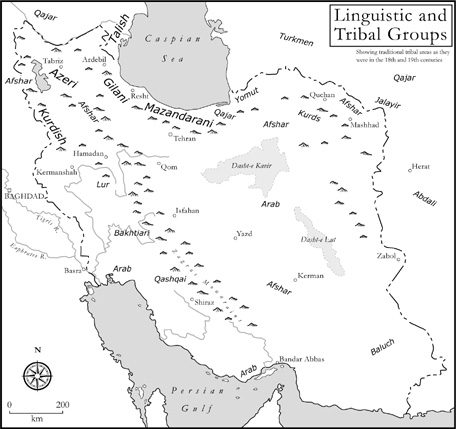
However, when I began to consider the reasons for these opinions, all these reasons given for the magnificence of human nature failed to convince me: that man is the intermediary between creatures, close to the gods, master of all the lower creatures, with the sharpness of his senses, the acuity of his reason, and the brilliance of his intelligence the interpreter of nature, the nodal point between eternity and time, and, as the Persians say, the intimate bond or marriage song of the world, just a little lower than angels, as David tells us. I concede these are magnificent reasons, but they do not seem to go to the heart of the matter
Next page

